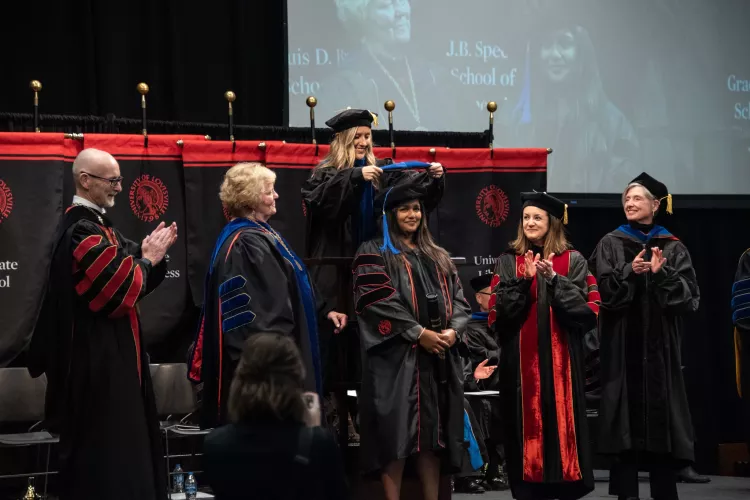UofL's Motor Retraining therapy provides hope for functional movement disorders
October 2, 2024Julia Semple spent 10 years trying to figure out what was wrong.
“It started with my head sort of twitching back and forth, like when you shake your head ‘no.’ It was completely involuntary,” Semple explained. “It progressed to other areas of my body over time. You know when you relax and you have a little twitch? Imagine that except a hundred times bigger and over and over again so you could never fall asleep. It was horrible.”
The symptoms interfered with Semple’s sleep as well as her work as a massage therapist and dancer. Unable to detect a physical cause for the symptoms, numerous physicians and other health providers in her home state of Delaware told her they likely were caused by stress. Finally, in 2016, a neurologist gave her condition a name: functional movement disorder.
Internet research led Semple to Kathrin LaFaver, MD, a neurologist at the University of Louisville and director of the Parkinson’s Disease and Movement Disorders Clinic at UofL Physicians. LaFaver developed the Motor Retraining program (MoRe), one of only a few such programs in existence for the treatment of FMD. MoRe was modeled after a program at Mayo Clinic and combines neurological treatment, psychological counseling, and physical and occupational therapy overseen by Darryl Kaelin, M.D., during a week-long inpatient therapy at Frazier Rehab Institute, a part of KentuckyOne Health. The program aims to improve patients’ motor symptoms, help them regain control over abnormal movements and develop better coping skills.
Functional Movement Disorders are common conditions involving abnormal movements – jerking, tremor or issues with gait or speech. The problems are due to miscommunications in the central nervous system. Patients often complain of fatigue and difficulties with concentration and thinking.
“Functional disorders are in the borderland between neurology and psychiatry, and there is a lack of treatment programs for the conditions. Diagnostic tests do not reveal a cause for the FMD, so patients experiencing symptoms often are told by neurologists that ‘nothing is wrong,’ and may be referred to a psychiatrist,” LaFaver said.
FMD can be triggered by psychological or physical stress or trauma, or may have no obvious trigger. Although it is not revealed in traditional imaging or other diagnostics, the condition is potentially reversible through multidisciplinary therapy. Patients from 25 states have undergone week-long inpatient therapy for FMD in the MoRe program at UofL. More than 85 percent of patients undergoing the MoRe program have shown improvement in their symptoms after one week of treatment, and 69 percent report the improvement of symptoms was maintained after six months.
Semple experienced significant improvement during her week of intensive therapy tailored to her individual needs and symptoms.
“After a decade of people telling me ‘take a vacation,’ or ‘there is nothing wrong with you,’ the care at UofL and Frazier was the best ever. Everyone – whatever their part was – they really cared,” Semple said.
“All of my life was wrapped up in trying to manage these symptoms. The treatment literally gave me my life back.”
Betty Coffman is a communications coordinator focused on research and innovation at UofL. A UofL alumna and Louisville native, she served as a writer and editor for local and national publications and as an account services coordinator and copywriter for marketing and design firms prior to joining UofL’s Office of Communications and Marketing.



